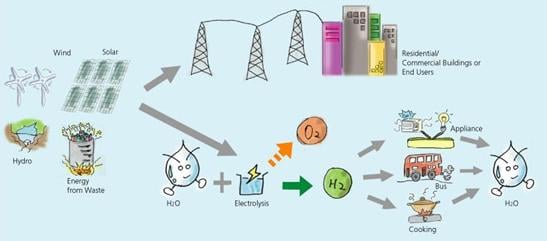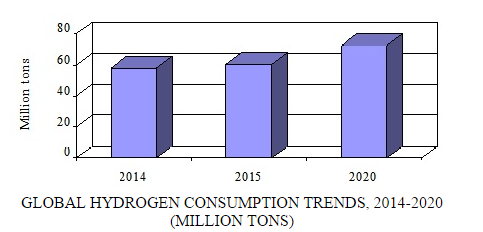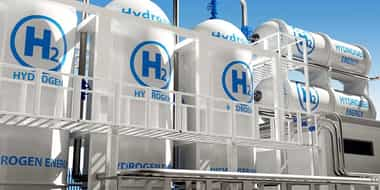
Dec 7, 2015
Blog Energy & Sustainability A Rationale for a Hydrogen Economy
The hydrogen economy is a vision of a future economy in which hydrogen used directly as a fuel or converted to electricity in systems such as fuel cells serves the primary form of energy for transportation and other mobile and fixed applications. However, hydrogen currently accounts for a negligible share of global energy consumption. It is currently used mainly as a process input in industries ranging from fertilizer to metallurgy. The largest single-end use of hydrogen is in refining crude oil into the gasoline used to power motor vehicles.
Hydrogen, through its reaction with oxygen, releases energy explosively in combustion engines or quietly in fuel cells to produce water as its only byproduct. It is distributed globally without regard for national boundaries, so using it to create a hydrogen economy only requires access to technology and capital. There is no need for political access. In many ways, hydrogen is an attractive replacement for fossil fuels. It does not occur in nature as the fuel H2. Instead, it occurs in chemical compounds such as water or hydrocarbons that must be chemically transformed to yield H2.
Most of the world’s hydrogen is currently produced from natural gas by a process called steam reforming. Producing hydrogen by steam reforming fossil fuels, however, weakens the basic rationale for the hydrogen economy in that it does not reduce the use of fossil fuels, but it instead shifts them from end use to an earlier production step. It still releases carbon to the environment in the form of CO2. Thus, to achieve the full benefits of the hydrogen economy, alternative technologies must be developed to produce hydrogen from non-fossil resources such as water using renewable energy sources.
According to BCC Research's Building the Global Hydrogen Economy: Technologies and Opportunities (EGY055C), total global consumption of hydrogen was approximately 58 million tons (MT) in 2014. Roughly 23% of this hydrogen was consumed in energy-related applications, mostly refining. A relatively small amount of the methanol produced from hydrogen is used as a fuel, although most of it is used to produce chemicals such as formaldehyde. In the 1990s, methanol was also used in the United States to make methyl tertiary-butyl ether (MTBE), an oxygenate that is blended with gasoline to enhance octane and create cleaner burning fuel. Use of MBTE as a motor fuel additive has declined dramatically due to environmental and health concerns.
Global investments in building the hydrogen economy cost more than $3.4 billion in 2014, and they are expected to approach $4.8 billion in 2015 and $21.8 billion by 2020. These figures represent a significant compound annual growth rate (CAGR) of 35.5% over the next five years.
Global consumption of hydrogen as an energy source (e.g., in fuel cells, internal combustion engines or turbines) is expected to grow over the next five years, but it will remain a very small share of total hydrogen consumption.
"The transition to a hydrogen economy will require large investments in capital equipment and durable goods at every stage of the hydrogen chain, from production of hydrogen through its distribution and storage to its conversion of to useful work or energy," says BCC Research energy analyst Andrew McWilliams. "These investments are economic challenges to the extent that they require the mobilization of sufficient financial resources, as well as business opportunities for providers of related goods and services."

Source: BCC Research, "Building the Global Hydrogen Economy: Technologies and Opportunities," November, 2015
RATIONALE FOR A HYDROGEN ECONOMY
The gap between the current technology for hydrogen production, storage, and use and that needed for a fully viable hydrogen economy is too wide to bridge in incremental advances. Closing this gap will require fundamental breakthroughs in technology and massive investments in new infrastructure. Hydrogen advocates point out the advantages of a hydrogen-based economy to justify these investments.
For the hydrogen economy to become a reality, hydrogen must be cost competitive with the available energy alternatives. The available evidence suggests that this is increasingly becoming the case. In the 2015 passenger car market, this means that hydrogen would need to be available at roughly $2.75 per gallon of gasoline equivalent (gge) untaxed. At this price, hydrogen fuel cell vehicles would have the same cost to consumers on a cost-per-mile-driven basis as a comparable conventional internal-combustion engine or hybrid vehicle. This figure appears to be within reach.
At present, state-of-the-art hydrogen extraction from natural gas, pressurized and delivered to the customer, costs approximately $4.50 per gge. The U.S. Department of Energy’s FY2014 Annual Progress Report describes technology under development that could reduce the cost of delivered hydrogen to as little as $2.85 per gge. Some Fuel Cell and Hydrogen Energy Association (FCHEA) member companies believe that hydrogen can be produced and delivered economically to fueling stations at costs as low as $1.20 per gallon of gasoline equivalent.
Technologies for converting hydrogen to energy, particularly fuel cells, but also hydrogen internal-combustion engines and turbines in the out years, account for the bulk of the market: 79.2% in 2014, increasing to 84% in 2020. Hydrogen production technologies are expected to lose market share (i.e., from 9% in 2014 to 8.4% in 2020). Hydrogen storage and distribution technologies should also lose market share (i.e., from 5.5% in 2014 to 1.7% in 2020), whereas the market share for other technologies, mainly hydrogen sensors, are expected to shrink from 6.2% to 5.9%.

Electrical switches—devices that control the flow of electricity—are the backbon...

As the world accelerates toward net-zero emissions, hydrogen, and ammonia have e...

Hydrogen technology is widely used across industries like glass, fertilizer, met...

We are your trusted research partner, providing actionable insights and custom consulting across life sciences, advanced materials, and technology. Allow BCC Research to nurture your smartest business decisions today, tomorrow, and beyond.
Contact UsBCC Research provides objective, unbiased measurement and assessment of market opportunities with detailed market research reports. Our experienced industry analysts assess growth opportunities, market sizing, technologies, applications, supply chains and companies with the singular goal of helping you make informed business decisions, free of noise and hype.